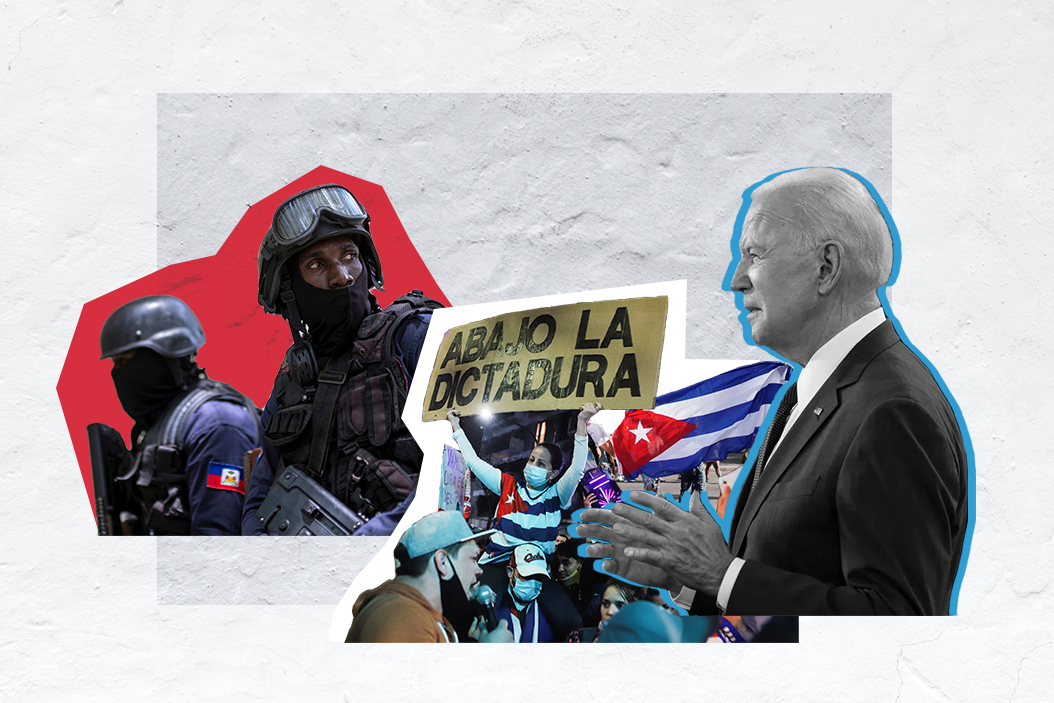All elected leaders face two problems: crises that weren't on the agenda will strike from unexpected directions, and all possible responses are less than ideal.
Hey, Joe Biden, Cuba's on line one, and Haiti's holding on line two.
What's happening?
In Cuba, COVID-exacerbated shortages of affordable food, medicine, liberty, and good government have triggered a startling surge of protests, the largest in decades, in cities across the island. The Cuban government has responded with pepper spray, handcuffs, internet cutoffs, accusations against Washington, and pleas for patience from Cuba's beleaguered people.
In Haiti, the shocking assassination of President Jovenel Moïse has created chaos in one of the world's poorest countries. Moïse had warned that unnamed oligarchs wanted him dead. For now, ambitious politicians and various criminal gangs are competing for power in Haiti, and fears of more violence are on the rise. Hundreds of Haitians, including children, have gathered outside the US Embassy in Port-au-Prince to beg for a ticket out of their country.
The US president faces intense pressure to act because these two countries are neighbors and there are large numbers of Cuban and Haitian Americans living in the United States. Both communities are concentrated in the politically crucial state of Florida.
What should Biden do about these crises?
Cuba options
As Barack Obama's vice president, Biden was a key foreign-policy player in an administration that wanted to ease a half-century of US isolation of Cuba. After all, Cuba's communists had survived the US policy of embargo, even after the Cold War's end left Cuba without its Soviet benefactor. If a policy hasn't worked in 50 years, try something else.
In March, dozens of Democratic Party lawmakers signed a letter which called on Biden to ease Trump administration restrictions on travel and the right of Cuban Americans to send money to family members living in Cuba, travel restrictions between Cuba and the US, and to offer medical aid to help Cubans survive COVID.
But if Biden eases economic pressures now, he'll be bailing out a communist dictatorship responsible for decades of repression and economic misery for ordinary Cubans. Republicans, led by Donald Trump and Florida Governor (and likely presidential candidate) Ron DeSantis have called on US companies to support Cuba's protesters, including by providing internet access into Cuba remotely. The US, they argue, must help Cubans risking arrest (or worse) for democracy and human rights to communicate with one another and the outside world.
Haiti options
Haiti's interim government, led by temporary Prime Minister Claude Joseph, wants the Biden administration to send US soldiers into Haiti to halt the risk of further violence, protect critical infrastructure, and safeguard the vote to replace the assassinated president. The White House says it's working with Joseph to hold elections as soon as possible, but Biden is deeply reluctant to inject US troops into this unstable situation. US soldiers can't bring democracy to Haiti any more than they could bring it to Afghanistan.
In addition to its political crisis, Haiti's government has not been able to provide its people with a single dose of COVID vaccine. This is an area the US can help. On Wednesday, the US delivered 500,000 doses of the Moderna vaccine to Haiti, and promised more will come. But without well-armed and well-trained soldiers to safeguard the process, vaccinations can be slowed by warring criminal gangs.
To the boats?
Another problem Biden must face: Whenever there's unrest in Cuba or Haiti, there's a risk that desperate people will climb into boats to attempt the dangerous crossing to Florida. It's both a humanitarian crisis and a political headache waiting to happen. Under both US and international law, asylum-seekers have a recognized right to file a claim no matter how they enter the country, but in the past, US officials have sometimes intercepted Cuban and Haitian boats before they enter US territory.
Biden's Homeland Security chief, himself the son of Cuban refugees, has made clear the administration's position: "If you take to the sea, you will not come to the United States." Though motivated by a desire to prevent innocent people from drowning, that policy has been denounced as "shameful" by human rights advocates, who argue that Haitians fleeing violence and Cubans fleeing tyranny have very good cause to apply for asylum.
Bottom line: Joe Biden would rather think about infrastructure spending, vaccinations and job creation, but Cuba and Haiti will continue to have other ideas.